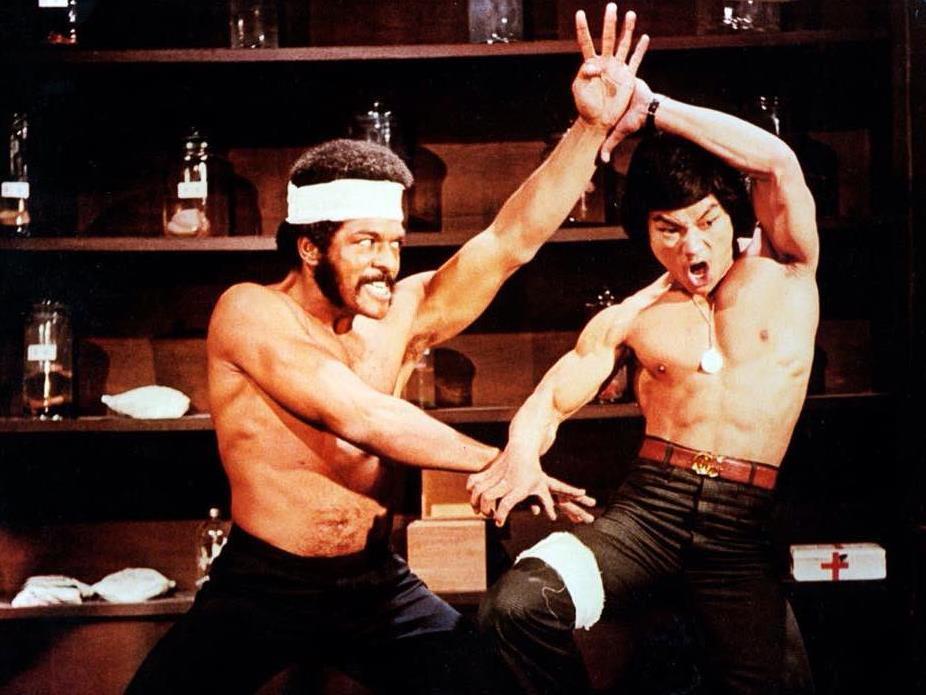Iron Fists and Kung Fu Kicks, courtesy of MIFF.
Mark Hartley’s Not Quite Hollywood: The Wild, Untold Story of Ozploitation has a lot to answer for. That 2008 documentary (approved by Quentin Tarantino and Edgar Wright) was the beginning of a rather unexpected boutique industry of documentaries – many made in Australia – that continues over a decade later with Serge Ou’s new film Iron Fists and Kung Fu Kicks. An obvious descendant to Hartley’s giddily gonzo celebration of Australian genre cinema of the 1970s and ‘80s, Ou’s film is (like Hollywood was) partly financed through the MIFF Premiere Fund and tells the exhaustive, ribald, often unhinged history of a cinematic sub-genre that bypassed good taste and critical acclaim and yet has found appreciative cult devotion.
Produced by Brisbane-based Veronica Fury (Ella, The Curse of the Gothic Symphony) with post-production by Queensland’s The Post Lounge, this Australian venture will likely find highly appreciative audiences worldwide even if those viewers likely won’t have the slightest inkling that it’s an Australian film.
That Not Quite Hollywood has cast such a long shadow is a little bit surprising considering it was a box office disappointment upon theatrical release. Despite this, it was a success at festivals and on the international buyers’ market. After premiering at the Melbourne International Film Festival, it screened at Toronto, Karlovy Vary, Rotterdam and Hong Kong film festivals while selling to Russia, Iceland, Canada, the UK, Germany, America and more. So, a success in other ways.
Most importantly, it ushered in a wave of reappraisal and nostalgia for once maligned Australian genre content of the 1970s and ‘80s. It’s a legacy that continues to this day thanks to independent distribution companies like Umbrella Entertainment who have turned the cult-like affection for this era of grimy grindhouse cinema and cheap video rentals into a profitable business model where even home entertainment releases of nothing but exploitation trailers (the Drive-In Delirium series) is a collectable for fans.
They are also easily programmable fodder for film festivals with MIFF’s line-up in particular offering savvy cultists a variety of geek-centric deep dives like Harley’s own Machete Maidens Unleashed! and Electric Boogaloo: The Wild, Untold Story of Cannon Films, Andrew Leavold’s The Search for Weng Weng, and John Johnson’s Rewind This! And then there’s others like Leavold’s The Last Pinoy Action King, British production Video Nasties: Moral Panic, Censorship & Videotape and Eric Drenner’s American Grindhouse among others.
Ou’s Iron Fists and Kung Fu Kicks is very much akin with these as it tracks the history of Hong Kong kung fu cinema from its beginnings at the Shaw Brothers Studio to its eventual influence on global cinema through The Matrix. Early passages lean heavily on a more standard timeline of point A to point B storytelling, but the film really comes alive when Ou focuses on societal and cultural intricacies aided by brief glimpses at news footage of the political unrest of the time.
The film swerves between funny tales of misadventures in English-language dubbing and a more serious focus on kung fu’s influence on international audiences, particularly those in the African American community. It explores kung fu’s role in the origins of breakdancing and parkour phenomenons. Its surprising influence on the film industries of South East Asia, Uganda and Australia, which have all taken bits and pieces from the traditions and filmmaking techniques and fused them with their own national identities, is a particular strength. And while it seems unnecessary in the grand scheme of kung fu, it was nice to see Brian Trenchard-Smith’s Australian-Hong Kong co-production get a lengthy segment to itself (just try getting Jigsaw’s theme song “Sky High” out of your head in the days following).
Technically, it rides too closely to Hartley’s signature style to stand out as its own unique work of documentary. The pace is appropriately frenetic, but in a curious criticism, names and bios of talking heads often fly by with little chance to be read. It strikes me that unlike Hollywood or Machete Maidens, the subject here is far too big for even 108 minutes and the result is that some sections feel as if they aren’t given their appropriate due. And even those who do feature prominently like Bruce Lee and Jackie Chan still come off as somewhat short-changed.
Of course, the main goals of a film such as this is to entertain and to incite interest in the genre it’s talking about. Despite minor misgivings, Iron Fists and Kung Fu Kicks succeeds at both quite easily. I have already made note of several titles including China O’Brien with Cynthia Rothrock, The 36th Chamber of Shaolin (locally available on Netflix) and The Deadly Art of Survival, an American kung fu art film set on the streets of bankrupt Manhattan. I can only hope that once this documentary begins its inevitable international roll-out, these films become more easily available.
| 3.5 stars |
★★★☆
|
Iron Fists and Kung Fu Kicks is re-screening at the Melbourne International Film Festival on the 16th and the 17th of August.
Iron Fists and Kung Fu Kicks
Director: Serge Ou
AUS, 2019, 108min
Distributor: Umbrella Entertainment
Premiered at the Melbourne International Film Festival 2019.
Actors:
Director:
Format:
Country:
Release:





